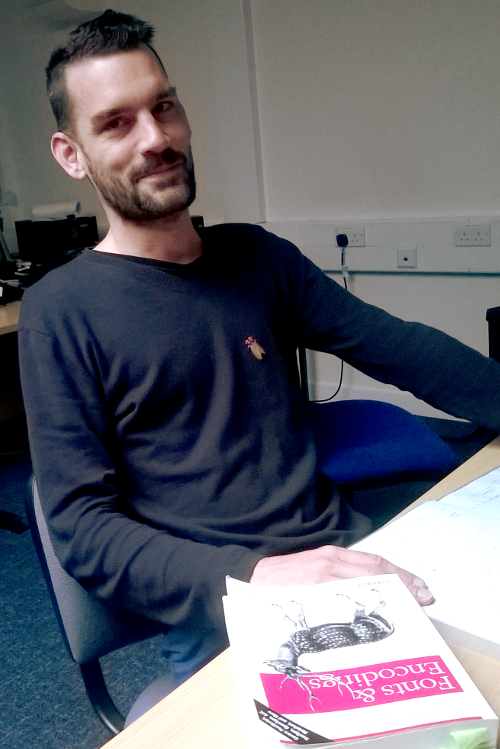News
We are pleased to announce that Microsoft Research and Microsoft have selected our Academic Research Request Proposal for the “Intelligent Canvas for Data Analysis and Exploration” as one of ten to award. MORE
We’re delighted to announce the launch of the LitLong iOS app, put together by a team of researchers and literary scholars from the University of St Andrews and University of Edinburgh, including SACHI’s Dr David Harris-Birtill, Dr Uta Hinrichs and Professor Aaron Quigley.
The LitLong:Edinburgh mobile app allows you to use your iOS device to explore Edinburgh’s literary past, and it is free! Download a copy to your iPhone, iPod Touch or iPad to discover how your location has been represented in literature.
MORE
 We are happy to welcome Johannes Lang to the SACHI lab. Johannes comes from Austria and is a typographer and type designer with top-level expertise in the digital aspects of text and type.
We are happy to welcome Johannes Lang to the SACHI lab. Johannes comes from Austria and is a typographer and type designer with top-level expertise in the digital aspects of text and type.
He will be working with Miguel Nacenta and Uta Hinrichs in the Infotypography project, funded by EPSRC, and helping further develop the FatFonts research program.
You can take a look at Johannes’ excellent work here in his studio webpage.

Congratulations to Professor Aaron Quigley who had been appointed the office holder for the ACM SIGCHI Adjunct Chair for Specialized Conferences by the ACM SIGCHI President Loren Terveen.
Aaron will take over from Philippe Palanque later this month and is looking forward to working with the ACM SIGCHI Executive Committee, Conference Management Committee and ACM staff over the next three years.
SACHI and the School of Computer Science in the University of St Andrews are delighted to welcome Dr Uta Hinrichs as a new lecturer. Uta has been a postdoctoral research fellow with SACHI since 2012 and she now co-leads SACHI along with her colleagues. During her time as a post-doc, Uta served on the program committee for CHI 2015 and she was the ACM ITS 2013 and ACM UIST 2013 volunteer co-chair. MORE
<!–Speaker: Anselm Spoerri, Rutgers University, USA
Date/Time: 2-3pm August 28, 2015
Location: CS1.33a, University of St Andrews–>
Abstract:
Conflicts occur in the peer-production process of Wikipedia and can culminate in “edit wars” for specific topics. This talk will present visualizations of the similarities and differences between the most controversial topics that have been identified in 10 different language versions of Wikipedia and discuss the dominant and shared themes of the controversies across languages and cultures. In addition, it will present visualizations of the most popular topics over time in the English version of Wikipedia and visually analyze the relationship between most controversial and popular topics. MORE
<!–Speaker: Pam Briggs, Northumbria University
Date/Time: 2-3pm Sept 29, 2015
Location: CS1.33a, University of St Andrews–>
Abstract:
Patients now generate a significant amount of online material about health. This raises questions about how we should design websites featuring patient knowledge and experience in order to ensure those sites provide a good match to patient needs. In this presentation I describe a structured participatory methodology for the development and evaluation of a set of patient experience websites that took place over three phases, consistent with experience based co-design: (1) a capture phase in which we worked with patients to understand their reactions to existing websites; (2) an understand phase in which we translated this information into a patient-engagement framework and accompanying set of design guidelines and (3) an improve phase, where we used these guidelines to create three new health websites that were then assessed as patient experience interventions in a range of empirical studies. MORE
<!–Speaker: Miranda Anderson, Bea Alex, Claire Grover, Uta Hinrichs and David Harris-Birtill
Date/Time: 2-3pm October 13, 2015
Location: CS1.33a, University of St Andrews–>
Abstract:
Today, many web services personalize their content, including Netflix (movie recommendations), Amazon (product suggestions), and Yelp (business reviews). In many cases, personalization provides advantages for users: for example, when a user searches for an ambiguous query such as “router,” Amazon may be able to suggest the woodworking tool instead of the networking device. However, personalization is rarely transparent (or even labeled), and has the potential be used to the user’s disadvantage. For example, on e-commerce sites, personalization could be used to manipulate the set of products shown (price steering) or by customizing the prices of products (price discrimination). Unfortunately, today, we lack the tools and techniques necessary to be able to detect when personalization is occurring, as well as what inputs are used to perform personalization.
In this talk, I discuss my group’s recent work that aims to address this problem. First, we develop a methodology for accurately measuring when web services are personalizing their content. While conceptually simple, there are numerous details that our methodology must handle in order to accurately attribute differences in results to personalization (as opposed to other sources of noise). Second, we apply this methodology to two domains: Web search services (e.g., Google, Bing) and e-commerce sites (e.g., BestBuy.com, Expedia). We find evidence of personalization for real users on both Google search and nine of the popular e-commerce sites. Third, using fake accounts, we investigate the effect of user attributes and behaviors on personalization; we find that the choice of browser, logging in, and a user’s previously content can significantly affect the results presented.
Bio:
Alan Mislove is an Associate Professor at the College of Computer and Information Science at Northeastern University. He received his Ph.D. from Rice University in 2009. Prof. Mislove’s research concerns distributed systems and networks, with a focus on using social networks to enhance the security, privacy, and efficiency of newly emerging systems. He is a recipient of an NSF CAREER Award (2011), and his work has been covered by the Wall Street Journal, the New York Times, and the CBS Evening News.
This seminar is part of our ongoing series from researchers in HCI. See here for our current schedule.
<!–Speaker: Andruid Kerne, Texas A&M, USA
Date/Time: 2-3pm June 26, 2015
Location: CS1.33a, University of St Andrews–>
 Abstract:
Abstract:
Centuries ago, the technology of movable type vaulted human consciousness and expression from oral performance—improvisational— to writing, fixed by letters and words. The Interface Ecology Lab investigates new technologies that transform human expression. We engage the human body with the digital. We use cloud and web to maximize impact. We investigate how curation, exploration, and body-based interaction support expression and ideation. MORE




